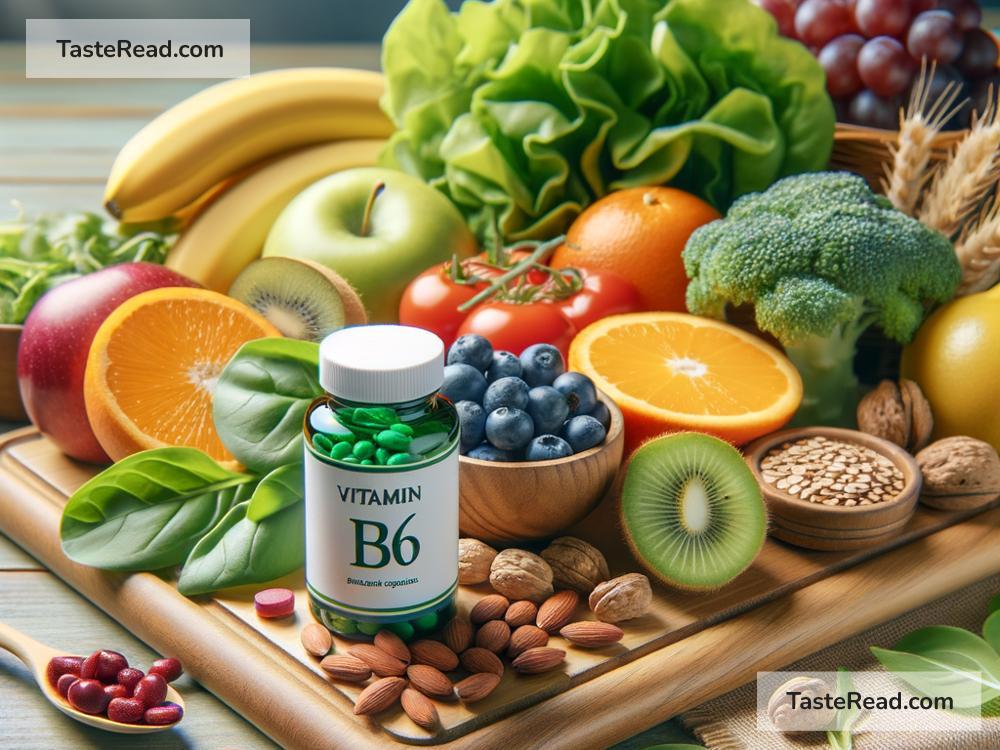The Role of Vitamin B6 in Metabolic Health
Our bodies are incredible machines that need the right kinds of fuel to keep running smoothly. Vitamins and nutrients play a vital role in making sure everything works the way it should. One of these important vitamins is Vitamin B6, which helps give our bodies energy, supports brain health, and keeps essential processes running behind the scenes. In this blog post, we’ll explore what Vitamin B6 is, why it’s so important for metabolic health, and how you can make sure you’re getting enough of it.
What is Vitamin B6?
Vitamin B6, also known as pyridoxine, is one of eight B vitamins that help our bodies convert food into energy. It’s water-soluble, meaning it dissolves in water and doesn’t get stored in the body for very long. That’s why we need a regular supply through the foods we eat.
Vitamin B6 is involved in over 100 enzyme reactions. Enzymes are like little workers in your cells—they speed up chemical reactions to help your body function properly. These reactions are all part of your metabolism, which is how your body processes food, produces energy, and removes waste.
How Does Vitamin B6 Support Metabolic Health?
Vitamin B6 plays a big role in your metabolism, which is your body’s way of keeping energy flowing and maintaining overall balance. Here are some key ways it helps:
1. Breaking Down Nutrients
One of the main jobs of Vitamin B6 is to help your body use nutrients like carbohydrates, proteins, and fats. For example:
– Carbohydrates: Vitamin B6 helps turn carbohydrates into glucose, which is your body’s primary source of energy.
– Proteins: It’s especially important for breaking down amino acids, the building blocks of protein. This helps build and repair tissues, muscles, and even your hormones.
– Fats: Vitamin B6 helps break down fats, ensuring your body has access to these energy-rich molecules when needed.
2. Producing Neurotransmitters
Vitamin B6 is essential for creating neurotransmitters, which are chemical messengers in your brain. These messengers help your nerve cells communicate with one another. Key neurotransmitters like serotonin and dopamine depend on Vitamin B6. Proper levels of these chemicals are essential for mood, focus, and overall mental health.
3. Making Hemoglobin
Hemoglobin is a protein in your red blood cells that carries oxygen around your body. Vitamin B6 plays a critical role in producing hemoglobin. Without enough hemoglobin, you could develop anemia, feel tired, or struggle with poor oxygen circulation.
4. Supporting Energy Production
Vitamin B6 is part of the process that turns food into adenosine triphosphate (ATP)—a molecule that stores and delivers energy to cells. Think of ATP like the battery that powers your body’s “engine.” The more efficient your energy production system is, the better your metabolism functions.
What Happens When You Don’t Get Enough Vitamin B6?
Vitamin B6 deficiency is rare if you eat a balanced diet, but it can happen, especially to people with certain medical conditions or dietary restrictions. Signs of deficiency include:
– Fatigue
– Irritability or depression
– Muscle weakness
– Cracks at the corners of your mouth
– Difficulty concentrating
Since Vitamin B6 is connected to so many vital processes, a deficiency can throw your entire metabolism off track. For example, your body might struggle to break down nutrients properly, leading to low energy levels and issues with blood sugar regulation.
How Can You Get Enough Vitamin B6?
The good news is that Vitamin B6 is widely available in everyday foods. You don’t need to rely on supplements if you eat a balanced diet. Here are some foods rich in Vitamin B6:
– Chicken and turkey: Lean meats like poultry are excellent sources of Vitamin B6.
– Fish: Tuna, salmon, and other types of fish provide a healthy dose of this vitamin.
– Vegetables: Potatoes, spinach, and carrots contain Vitamin B6.
– Fruits: Bananas, avocados, and watermelon are great choices.
– Whole grains: Brown rice, oatmeal, and fortified cereal can also boost your intake.
– Nuts and seeds: Sunflower seeds, pistachios, and almonds contain Vitamin B6.
If you’re following a vegetarian or vegan diet, plant-based options like beans, legumes, and fortified cereals can help meet your needs.
How Much Vitamin B6 Do You Need?
The amount of Vitamin B6 you need depends on your age and gender. For most adults, the recommended daily intake is around 1.3 to 2 milligrams per day. Pregnant or breastfeeding women typically need more. If you’re unsure about your Vitamin B6 levels, it’s always a good idea to talk to your doctor or a dietitian.
Final Thoughts
Vitamin B6 might not make headlines like Vitamin C or D, but its role in metabolic health is just as essential. This hardworking vitamin helps your body break down food, keep your brain sharp, and maintain energy levels. By eating a variety of nutritious foods, you can ensure your body has all the Vitamin B6 it needs to function at its best.
So, next time you fill your plate, remember to include foods rich in Vitamin B6. Your metabolism will thank you for it!


